On the value orientations of researchers in the field of education
Recieved: 04/04/2017
Accepted: 04/19/2017
Published: 06/28/2017
Pages: 106-115
DOI: 10.11621/npj.2017.0212
Keywords: researcher; value orientations (VO); characteristic features of professional status; demographic factors; psychological well-being; social well-being
Available online: 28.06.2017
Sobkin, V.S., Andreeva, Anna I., Rzaeva, Fatima R. (2017). On the value orientations of researchers in the field of education. National Psychological Journal, (2) , 106-115. https://doi.org/10.11621/npj.2017.0212
Copied to Clipboard
CopyAbstract
The paper presents the results of the sociological study of life values in researchers in the sphere of education. According to a specially designed questionnaire that included 72 questions, 721 people were interviewed. The sample of respondents included employees with different levels of academic qualifications and experience of professional activity, living in various regions of Russia. The respondents are the employees of the Scientific Research Institute and various universities. The purpose of the study is to determine the impact of social demographic features (age, gender, financial status) and a number of social indicators of professional activity (seniority, position, availability of scientific degrees and titles, having a permanent job or working flexi time, publication activity) to life values in researchers. Special attention is paid to the influence of the emotional assessment of their life prospects, social status in the scientific group and migration plans over the evaluation of the significance of certain life fears. The research results reveal the hierarchy of the life values in researchers. The influence of traditionalist gender differences in the value orientations of researchers is emphasized. Two developmental stages are to identified with the significant transfer changes of life orientations in researchers. The influence of the scientific status (academic degree, academic rank, position held, publication activity) on the value orientations and professional well-being of the scientific employee are highlighted. The common data show the role of social psychological factors (assessing the success of their life prospects, social status in the team, migration plans) in determining the significance of certain life values. The identified trends are interpreted with respect to the issues of social success and professional development of researcher.
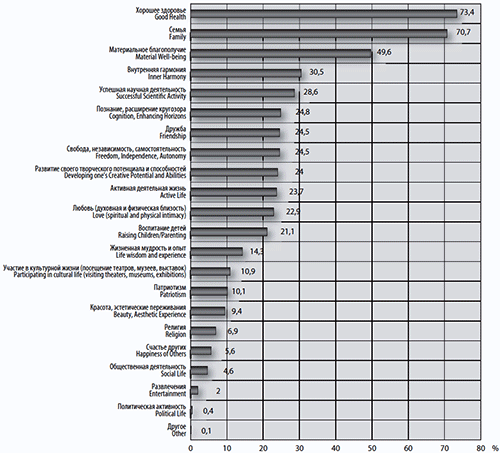
Fig. 1. The distribution of life values among researchers (% of the respondents who answered the question)
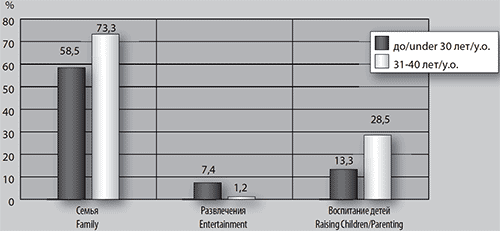
Fig. 2. Dynamics of changes in value orientations among researchers in the age groups up to 30 years and 31–40 years (%)
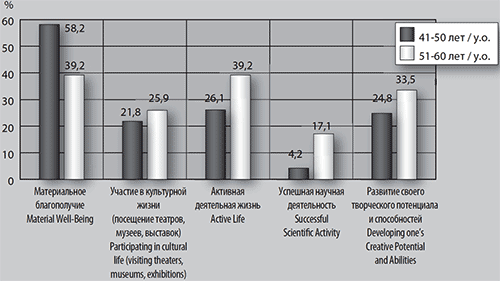
Fig. 3. Dynamics of changes in value orientations among researchers in the age groups 41–50 years and 51–60 years (%)
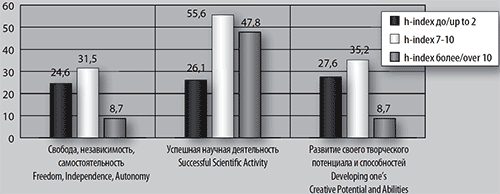
Fig. 4. Distribution of answers to the question of meaningful life values among researchers with different Hirsch index indicators (%)
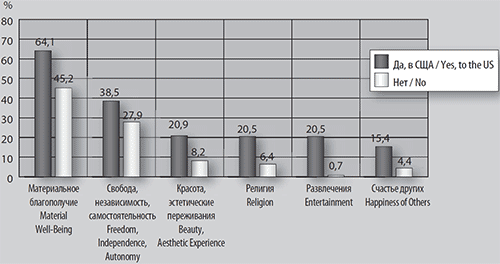
Fig. 5. Differences in life values between researchers who express the attitude to emigrate from Russia and those who does not have such a desire (%)
References:
Berdyayev, N.A. (1991) Self-perception (Experience of philosophical autobiography). – Moscow, Izdate’stvo «Kniga», 416.
Dobrynina, V.I. (1997) Philosophy of the 20th century. Tutorial. Moscow, TsINO obschestva “Znanie” Rossii, 288.
Elishev, S.O. (2010) Theoretical and methodological approaches to the study of the concepts of «value» and «value orientations». [Vestnik moskovskogo universiteta]. Sociology and Political Science, 3, 74–90.
Frankle, V. (1990) The man in search of meaning. Moscow, Progress. Vol. 368, 21.
Fromm, E. (2000) To have or to be? Izdatel’stvo AST,126.
Kashirsky, D.V. (2014) Psychology of personal values. Doctor of Psychology, Thesis. Moscow.
Karpenko, L.A. (1985) Psychological Dictionary. (Eds.) A. V. Petrovsky, M. G. Yaroshevsky. Moscow, Politizdat, 431.
Korzh, N.V. (2011) The issue of values and attitudes in sociology. [Universitet imeni V.I. Vernadskogo], 3 (34), 327–332.
Leontyev, D.A. (1998) Value representations in individual and group consciousness: species, determinants and changes in time. [Psikhologicheskoe obozrenie], 1, 13–25.
Magun, V.S., & Rudnev, M.G. Vital values of the Russian population: similarities and differences in comparison with other European countries // Bulletin of Public Opinion, 2008, No. 1 (93).
Makarov V.A. (2012) An empirical analysis of the basic American values, 4, 122.
Maslow, A. (2012) Motivation and personality. Izdatel’stvo Piter, Series Masters of Psychology, 352.
Rokich, M. (2005) The method of «value orientations». [Bol’shaya entsiklopediya psikhologicheskihh testov]. Moscow, Eksmo, 26–28.
Rubinshtein, S.L. (1973) Issues of general psychology. Moscow, Pedagogika, 365.
Shvarts, Sh. et al. (2012) A refined theory of basic individual values: application in Russia Psihologija. [Zhurnal Vysshey shkoly ekonomiki], Vol. 9, 2, 43–70.
Sobkin, V.S., & Adamchuk, D.V. (2016) Modern teacher: life and professional orientations. Proceedings on the Sociology of Education, Vol. XVIII, Issue XXX. Moscow, FGBIU «IUO RAO», 216.
Sobkin, V.S., & Pisarsky, P.S. (1994) Vital values and attitude to education: a cross-cultural analysis of Moscow-Amsterdam. Based on a sociological survey of teachers, students and parents. Moscow, Tsentr sotsiologii obrazovaniya RAO, 151.
Sobkin, V.S., Pisarsky, P.S., & Kolomiets, Yu.O. (1996) Teaching as a social and professional group. Moscow, Riga: Rossiyskaya akademiya obrazovaniya RAO, 53.
Sobkin, V.S. (2009) The attitude of teachers towards the Unified State Exam (on the basis of sociological research). Works on the Sociology of Education. Vol. XIII. Issue XXIII. Moscow, Institut sotsiologii obrazovaniya RAO, 233.
Sobkin, V.S., Andreeva, A.I., & Rzaeva, F.R. (2017) Professional mobility of researchers in the field of education. [Pedagogika], 1, 42–57.
Sobkin, V.S., Andreeva, A.I., & Rzaeva, F.R. The social well-being of the scientific employee: life fears. [Vestnik TyumGU, Gumanitarnye issledovaniya] (in press).
Sobkin, V.S., & Rzaeva, F.R. (2016) Scientometric indicators of research in the sphere of education. [Obrazovatel’naya politika], 3 (73), 61–73.
Turpenko, A.S. (2012) On the phenomenological method in axiology. [Seriya «Filosofiya. Kulturologiya. Politologiya. Sotsiologiya»]. Vol. 24 (65), 4, 100–111.
Yakovleva, A.V. (2009) American way of life and values of life. [Vestnik KGU imeni N.A. Nekrasova], 4, 264–269.
Sobkin, V.S., Andreeva, Anna I., Rzaeva, Fatima R.. On the value orientations of researchers in the field of education. // National Psychological Journal 2017. 2. Pages106-115. doi: 10.11621/npj.2017.0212
Copied to Clipboard
Copy

